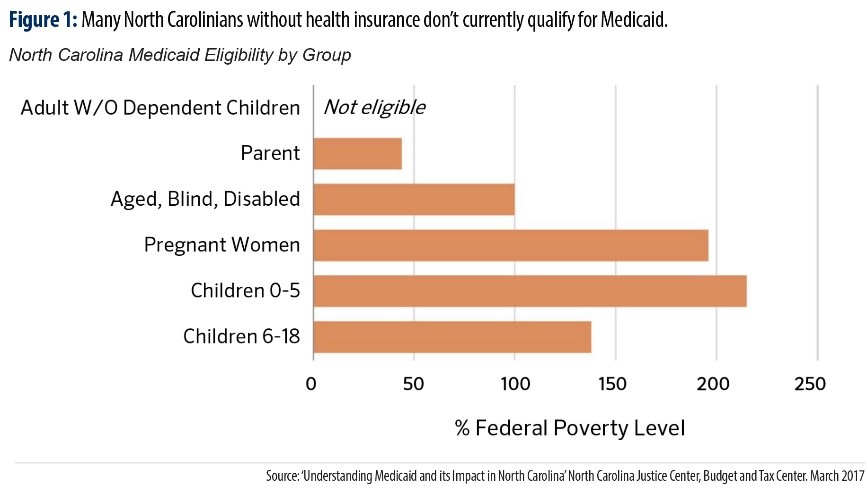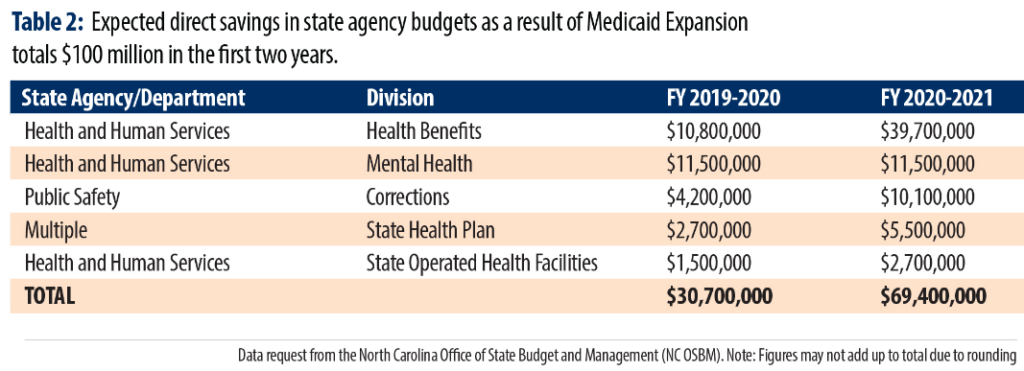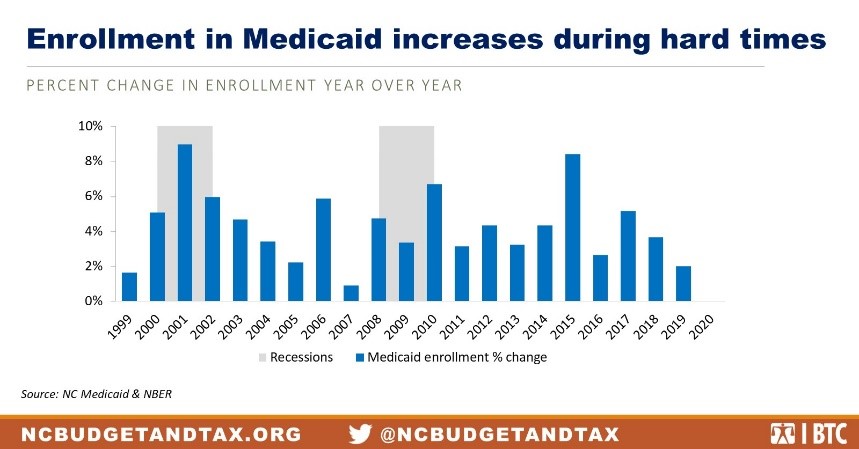Why Medicaid Expansion is Important
Prior to the coronavirus pandemic, North Carolina’s uninsured rate was approximately 13 percent, representing nearly 1.1 million people.1 It was also estimated that at least 500,000 North Carolinians would be eligible for coverage through Medicaid expansion, many of whom are currently uninsured. Given that Medicaid eligibility under expansion is determined by income, this number would likely grow substantially given the significant income and job losses thus far as a result of the outbreak and the future losses to follow.
Definition of Gaps
In the absence of Medicaid expansion, current eligibility for North Carolina Medicaid is extremely restrictive for many people. Non-parenting adults are ineligible, and eligibility for parents is restricted to those with extremely low incomes. Medicaid expansion would establish the income eligibility to 138 percent of the federal poverty level for adults age 18 to 64. In addition, there is ample data to suggest that as adults become newly eligible for coverage, enrollment for children also increases.2

New Challenges Due to Coronavirus
The new coronavirus has caused North Carolina and the world to grapple with unprecedented challenges. It has also highlighted the importance of a strong safety net where individuals and families can access the resources they need to stay healthy and safe. We are all at risk when a fellow North Carolinian is sick and vulnerable. For some this crisis has led to mild discomfort due to shifting routines and restrictions on movements, yet for others it has disrupted their already precarious health status and safety.
With an expected increase in the number of uninsured North Carolinians, it is essential that everyone can access health services, including testing and treatment of the coronavirus disease. The Economic Policy Institute estimated that during the last two weeks of March, over 105,000 North Carolinians lost their employer sponsored health insurance due to job loss.3 Overwhelming research demonstrates that people who have low incomes and are uninsured have higher rates of chronic health conditions that are often untreated exacerbating their risk for COVID-19 infection and complications.4 Access to care and treatment is critical to ensuring that the health status of uninsured individuals does not decline during this crisis.
Case for Public Policy and Investment
Data and findings published by the NC Budget & Tax Center highlighted the savings to the state’s budget that would result from Medicaid expansion (see Table 2)5 as well as the vital support it would provide to rural hospitals.6
Additionally, the Families First Coronavirus Response Act recently passed by Congress included a temporary 6.2 percent increase in each state’s Federal Medical Assistance Percentage (FMAP) rate, the proportion of Medicaid costs paid by the federal government compared to the state, bringing North Carolina’s current FMAP rate up from 67 percent to 73 percent.7 While this increase in federal funds does not apply to the expansion population,8 it will substantially increase the financial capacity of the state to support any increase in enrollment, in addition to the savings the state would already experience due to Medicaid expansion.9 Furthermore, as federal responses continue to unfold in the coming weeks, a major proposal being put forward is for the federal government to take on the state share of Medicaid costs which has historically been a critical tool in downturns.10

Recommendation
Recent history has shown that when economic conditions become tough, such as during a recession, enrollment in Medicaid increases. This countercyclical trend is also observed nationally, but data demonstrate this trend in North Carolina. During the great recession, for example, the Centers for Medicaid and Medicare Services (CMS) reported a 6.5 percent increase in enrollment nationally in the first year and 5.6 percent increase in the following year.11 Our analysis shows a 4.7 percent increase in the first year and a 3.4 percent increase in the following year in North Carolina. Similarly, the rate of uninsured has historically increased during recessions,12 though these occurred prior to the implementation of the Affordable Care Act. However, it is the tendency of state governments to respond to these increases by making cuts to the state’s support for the program.

Given the widespread, devastating impact of the coronavirus pandemic, cutting access to this vital public health program would be unthinkable. Instead, it should be expanded so that more people can receive services and benefits they desperately need.
Footnotes
- https://www.kff.org/other/state-indicator/nonelderly-0-64/
- https://ccf.georgetown.edu/2017/09/15/medicaids-welcome-mat-effect-means-medicaid-expansion-helps-children-get-health-coverage/
- https://www.epi.org/blog/3-5-million-workers-likely-lost-their-employer-provided-health-insurance-in-the-past-two-weeks/
- https://www.healthaffairs.org/do/10.1377/hpb20180817.901935/full/; https://www.healthypeople.gov/2020/topics-objectives/topic/social-determinants-health/interventions-resources/poverty; and https://www.thelancet.com/journals/lancet/article/PIIS0140-6736(17)30571-8/fulltext
- https://www.ncjustice.org/publications/financing-health-care-for-north-carolinians-in-the-coverage-gap/
- https://www.ncjustice.org/publications/strong-medicine-why-medicaid-expansion-is-the-right-treatment-for-rural-hospitals-economies/
- https://www.kff.org/medicaid/state-indicator/federal-matching-rate-and-multiplier/?currentTimeframe=0&sortModel=%7B%22colId%22:%22Location%22,%22sort%22:%22asc%22%7Dp
- https://www.medicaid.gov/state-resource-center/downloads/covid-19-section-6008-faqs.pdf
- https://www.cbpp.org/blog/medicaid-funding-boost-for-states-cant-wait
- https://www.cbpp.org/research/economy/cares-act-includes-essential-measures-to-respond-to-public-health-economic-crises
- https://www.cbpp.org/research/recession-threatens-state-health-care-programs
- https://www.kff.org/wp-content/uploads/2013/01/8264.pdf
 Justice Circle
Justice Circle